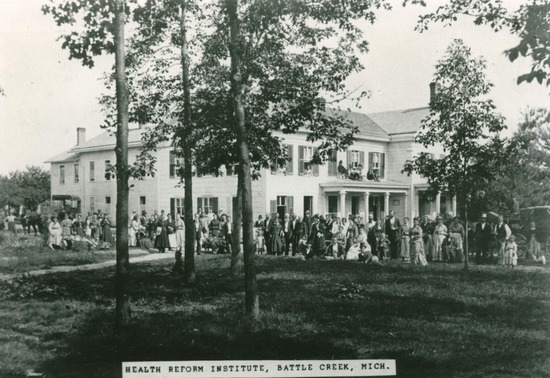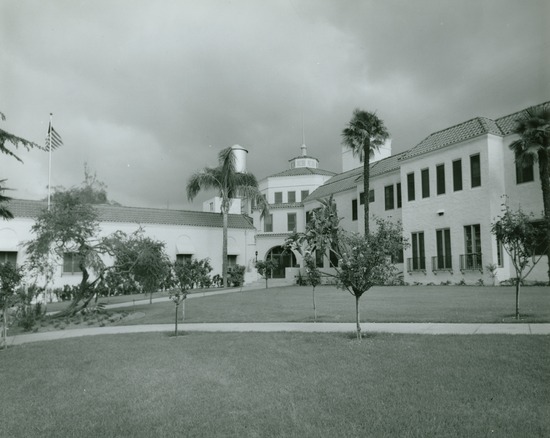Adventists talk a lot about health principles and disease prevention. But how do we handle sickness and medical needs when they inevitably come along?
The Seventh-day Adventist Church believes in and supports evidence-based medical care. In fact, medicine has played a significant part in our history, and today we run a major health system with hospitals, medical schools, and clinics throughout the world.
Whole-person care is integral to our mission as a denomination.
For more on this, we’re going to look at:
- Why Adventists believe in medical care
- Why would someone think we don’t believe in medical care?
- When might Adventists reject medical care?
- Healthcare in Adventist history
Why Adventists believe in medical care
Adventists value a whole-person approach to health because we want to follow Jesus’ model of caring for physical, mental, and spiritual needs. From our beginnings, we’ve supported “scientific approaches to health care over pseudoscientific ones.”1 Our hospitals, medical schools, and clinics are a case in point.
A healthy lifestyle is the first line of defense in preserving health, but we also recognize the need for proper medical treatment. All members are free to seek out and choose the care that is best for their situation.
And this philosophy originates with Jesus.
Jesus cared for people’s physical, mental, and spiritual needs while on this earth. Healing was a significant part of that work. Matthew 4:23 tells us that:
“Jesus went about all Galilee, teaching in their synagogues, preaching the gospel of the kingdom, and healing all kinds of sickness and all kinds of disease among the people” (NKJV).
Meeting physical needs opened people’s hearts to receive the truths Jesus had for them.
Likewise, church members show the healing ministry of Jesus by meeting people’s physical needs. This is why we have 190 hospitals worldwide, plus clinics and medical schools such as Loma Linda University.
With that said, you may be wondering why, then, some might be confused about our stance on medical care.
Why would someone think Adventists don’t believe in medical care?
Despite the Adventist Church’s strong support of medical care, some people have concluded that we don’t believe in it. There are two reasons for this:
- Misunderstanding our focus on lifestyle and natural remedies
- Confusing us with other religions that don’t believe in medical care
Misunderstanding our focus on lifestyle and natural remedies

Photo by Lisa Hobbs on Unsplash
Adventists talk a lot about our eight principles of health and well-being: nutrition, exercise, water, sunlight, temperance, air, rest, and trust in God. Indeed, God has provided many things in nature that are healing and beneficial.
Some, for instance, may opt to try certain herbal remedies or hydrotherapy (treatment with water) before going ahead with conventional treatment.
One common reason for doing so is to avoid the negative side effects of certain medications while also supporting the body’s natural processes of healing.
Others have had success with reversing chronic conditions, such as diabetes or hypertension, through a plant-based diet, exercise, and other lifestyle changes (while under the supervision of a doctor). In these situations, natural methods often work well alongside modern medicine.
Thus, this emphasis on natural methods doesn’t mean we discard conventional medical care or reject medical advice. Some individuals may do so, but the official stance of the Adventist Church has always supported people in getting proper medical care for their situations.
Confusing us with other denominations or religions that don’t believe in medical care

Photo by Nguyễn Hiệp on Unsplash
Some religions, and even Christian denominations, have rules about medical care that people have misapplied to Adventists.
For example:
Jehovah’s Witnesses don’t believe in taking blood transfusions.2 They see it as “a religious issue rather than a medical one.”
The Amish3 tend to rely on home remedies, even though their religion doesn’t forbid seeking medical care.
Christian Scientists believe in praying for healing and encourage their members to go to Christian Science practitioners rather than seeking traditional medical care.4
But as we’ve explored up to this point, none of these viewpoints reflect Seventh-day Adventist beliefs. We don’t discourage our members from seeking medical treatment.
But let’s look at a few cases in which Adventists might reject medical care, or certain types of treatments.
When would Adventists reject medical care?

Photo by SHVETS production
Adventists strongly believe that modern medicine has its place. We support medical care and the freedom to make choices in this area. But with the Bible as our foundation, many Adventists have moral and ethical convictions to avoid accepting treatment that would take life.
These kinds of things would include:
- Abortion
- Euthanasia, “mercy killings,” or assisted suicide
Our main reason for this is that we see life as a gift from God that begins at conception (Psalm 139:16; Jeremiah 1:5). He asks us to value that life (Exodus 20:13), so we don’t believe it is our prerogative to end it for medical reasons.
(Note: This does not necessarily apply in cases of patients with “Do Not Resuscitate” orders.)
In 2019, the General Conference of Seventh-day Adventists said the following in its official statement on abortion:
“The Seventh-day Adventist Church considers abortion out of harmony with God’s plan for human life. It affects the unborn, the mother, the father, immediate and extended family members, the church family, and society with long-term consequences for all. Believers aim to trust God and follow His will for them, knowing He has their best interests in mind.”
You can also find the following official statement about euthanasia:
“While Christian love may lead to the withholding or withdrawing of medical interventions that only increase suffering or prolong dying, Seventh-day Adventists do not practice ‘mercy killing’ or assist in suicide (Genesis 9:5, 6; Exodus 20:13; 23:7). They are opposed to active euthanasia, the intentional taking of the life of a suffering or dying person.”
These statements are not meant to point fingers, however. We don’t condemn those who have chosen to use one of these methods. We recognize these are difficult topics and approach all people with sensitivity and grace.
When it comes to other medical topics, such as vaccinations or birth control, Adventists have many different viewpoints.
Some individuals have strong reasons for not taking certain vaccinations or using birth control. Others have equally strong reasons for doing so. That’s why the Adventist Church supports the freedom to make decisions according to conscience.
Let’s take a moment now to understand how healthcare has developed throughout the history of Adventism, bringing us to where we’re at now.
Healthcare in the history of the Adventist Church
Since 1865, healthcare has been an important part of the Adventist mission. Ellen White, one of our founders, encouraged this movement and the development of health institutions.
Here’s how it started.
Our first health institution
Back in the mid-1800s, medical treatment was at a turning point. Many had bought into snake oil potions from “doctors” who, in reality, had very little training. Bloodletting, the use of mercury and arsenic (among other things) as medicine, and improper hygiene—all of these and more had made people skeptical of the medical profession.5
As a result, new and varied approaches were popping up. Some people began to explore the influence of lifestyle on health and disease.
During this time, the Holy Spirit impressed Ellen White with the importance of basic health principles, like proper nutrition (such as a vegetarian diet), exercise, sleep, etc. And in 1865, she advocated for the Church to start its own health institutions where it could teach these principles.

Courtesy of the Ellen G. White Estate, Inc.
Notice what she wrote:
“The Lord years ago gave me special light in regard to the establishment of a health institution where the sick could be treated on altogether different lines from those followed in any other institution in the world. It was to be founded and conducted upon Bible principles…and it was to be in His hands one of the most effective agencies for giving light to the world. It was God’s purpose that it should stand forth with scientific ability, with moral and spiritual power, and as a faithful sentinel of reform in all its bearings.”6
God wanted Adventist medical centers to not only reflect biblical principles but also “stand forth with scientific ability.”
When the first one—the Western Health Reform Institute (later the Battle Creek Sanitarium) in Michigan, USA—began in 1866, its care was far ahead of its time. It hired medical professionals—both doctors and nurses—to give natural treatments and teach principles that are now verified by science.
Later on, it became known as the Medical and Surgical Sanitarium and continued to use scientifically-based treatments.7
At its peak, many well-known individuals were treated there. Individuals like John D. Rockefeller, Henry Ford, Thomas Edison, William Howard Taft, Warren Harding, Calvin Coolidge, and the Roosevelts.8
The work at Battle Creek paved the way for other medical institutions in the Church.
Keeping up with medical advances
Ellen White herself was open to the scientific advances of her time, such as the smallpox vaccine, x-ray therapy, and blood transfusion.9 By the turn of the century, surgical procedures had greatly improved, and she supported their use. Here’s what she said about surgery:
“If there is need of a surgical operation, and the physician is willing to undertake the case, it is not a denial of faith to have the operation performed.”10
Through her own actions, this leader in Adventism encouraged church members to be pioneers in healthcare, eventually leading to the innovative medical establishments we have today.
A medical school and more hospitals

Courtesy of the Ellen G. White Estate, Inc.
In 1905, Adventists incorporated Loma Linda Sanitarium (California, USA) and opened its nursing school. It grew and expanded, so they built an 11-story building in 1967—which is still used today. In 1993, it added the Loma Linda University Children’s Hospital, providing a total of 900 beds for patients.
Today, Loma Linda University and Medical Center are on the cutting edge of technology and medical care. The university receives students from 80 countries and every state in the United States into its various programs—dentistry, medicine, nursing, pharmacy, public health, etc.
Other well-known medical institutions are Adventist HealthCare (Maryland), the Adventist Health network (west coast and Hawaii), AdventHealth (Florida), and Kettering Health (Ohio).
Adventists also continue to raise the standard of care in other countries. Loma Linda University Health has helped establish hospitals in places like Africa, Asia, and South America. And Adventist Mission has sent doctors and nurses to work in clinics and hospitals worldwide.
Some Seventh-day Adventist hospitals and health centers in the East Central Africa region are:
- Adventist Medical Centre in Kampala, Uganda
- Karora Adventist Health Center in Kibuye, Rwanda
- Kendu Adventist Hospital in Kendu Bay, Kenya
- Kinshasa Adventist Health Center in Kinshasa, Democratic Republic of the Congo
Adventists promote freedom of choice in medical care
Medical care and technology are invaluable in saving and preserving life. And as long as they’re used in this way, the Adventist Church stands behind their use. We support medical advancement and participate in it through our many medical institutions and professionals worldwide.
It’s one of the ways we show the love and care of Christ.
And for personal medical needs, Adventists have free choice in whether to seek care, and what kind to get—just like anyone else. God offers us freedom of choice, and we believe in offering the same to others.
- DuBose, Edwin R., ed., “The Seventh-day Adventist Tradition: Religious Beliefs and Healthcare Decisions,” Park Ridge Center for the Study of Health, Faith, and Ethics, 2002, p. 2. [↵]
- https://www.jw.org/en/jehovahs-witnesses/faq/jehovahs-witnesses-why-no-blood-transfusions/ [↵]
- https://groups.etown.edu/amishstudies/cultural-practices/health/ [↵]
- https://www.christianscience.com/press-room/questions-and-answers [↵]
- Robinson, Doris, The Story of Our Health Message (Southern Publishing Association, Nashville, TN, 1965), pp. 17–22. [↵]
- White, Ellen, Counsels on Health (Pacific Press, Mountain View, CA, 1923) p. 204. [↵]
- Gomide, Jonathan, “Battle Creek Sanitarium (1866–1942),” Encyclopedia of Seventh-day Adventists, Feb. 27, 2022. [↵]
- Ibid. [↵]
- Hirst, Albert, “Ellen White’s Attitude Toward Medical Progress,” Adventist Review, July 14, 1983.[↵]
- White, Ellen. Manuscript 67, 1899. [↵]
Related Articles
More Answers
How to Join the Seventh-day Adventist Church
Whether you heard about the Seventh-day Adventist Church through a traveling evangelist, during your online searches, or through a loved one or relative, you might be considering joining yourself.
How Do Adventists Make Movie and Music Choices?
We have entertainment at our fingertips. With just a tap on our smartphones, we can access all the latest movies, music, YouTube videos, and more.
Do Adventists Celebrate Birthdays?
Yes, most Seventh-day Adventists do celebrate birthdays because we see them as excellent reminders of the life God has blessed us with. And we celebrate them the same way everyone else does—with friends, family, presents, and a special meal.
Are Seventh-day Adventists Christians?
Yes, the Seventh-day Adventist Church is a Protestant Christian denomination formed in 1863. Just like other Christians, we believe that Jesus Christ is our Savior and seek to follow the principles of the Word of God.
Do Seventh-day Adventists Believe in the Secret Rapture
The secret rapture belief asserts that the followers of Jesus will be suddenly and stealthily “raptured” from earth and taken to heaven. Then, any people left on earth will face a period of great difficulty—before Christ’s second coming actually happens.
The Seventh-day Adventist Hymnal
The Seventh-day Adventist Hymnal is a songbook used worldwide by many Adventist congregations during their worship services. Since its publication in 1985, it has helped foster praise to God while reminding church members of our mission and drawing them closer to Jesus.
Do Adventists Have Their Own Bible?
Adventists have some unique beliefs—you might be able to name some of them right now. The seventh-day Sabbath. Death as a sleep. Hell as nonexistence.
Do Adventists Celebrate Communion and Foot Washing?
Like many Christian denominations, Adventists regularly participate in communion, also referred to as the “Lord’s Supper” or the “Last Supper.” They also practice foot washing (John 13:1-20), or the “ordinance of humility,” during the service—which isn’t as common.
How do Adventists choose what to eat?
Every day, parents go through the ritual of getting their kids to eat what is healthy and good while trying to steer them away from what can hinder the growth of their developing bodies. Nutritionists work with their clients to make better food choices.
What Are Seventh-Day Adventist Sermons Like?
In nearly every Seventh-day Adventist Church, the sermon is the focal point of the main service—similar to many Protestant Christian denominations. It is a time of biblical instruction by the pastor, who shares what they’ve been studying in the Bible and preparing over the previous week.
Didn’t find your answer? Ask us!
We understand your concern of having questions but not knowing who to ask—we’ve felt it ourselves. When you’re ready to learn more about Adventists, send us a question! We know a thing or two about Adventists.












